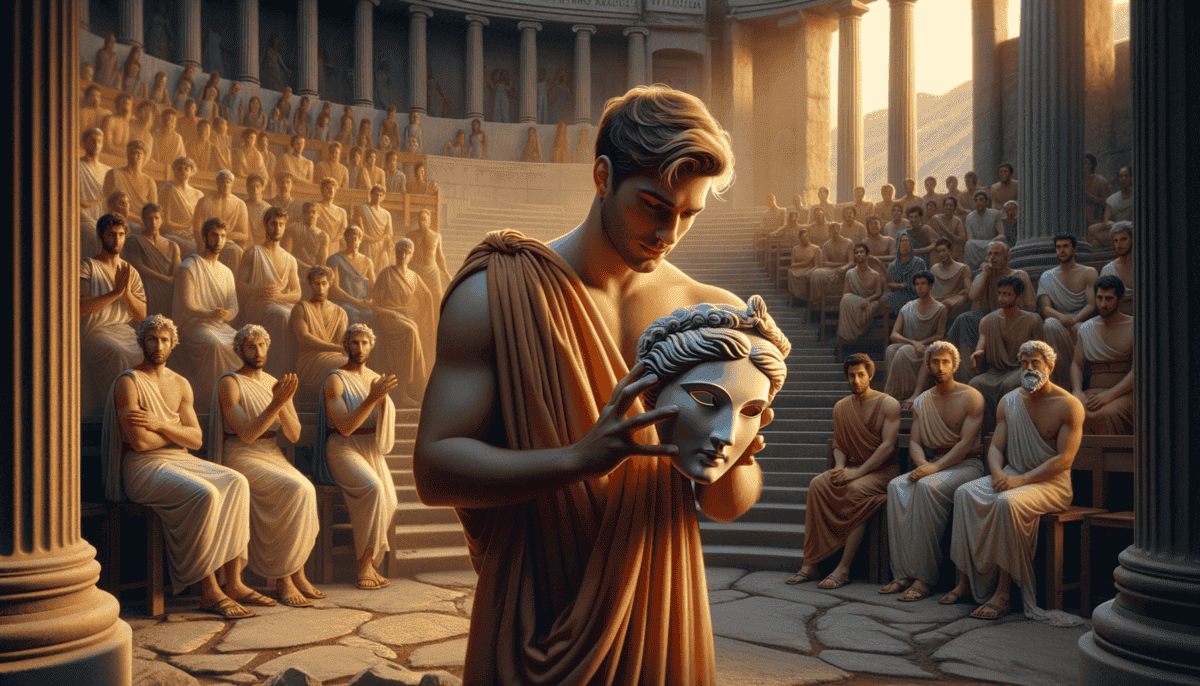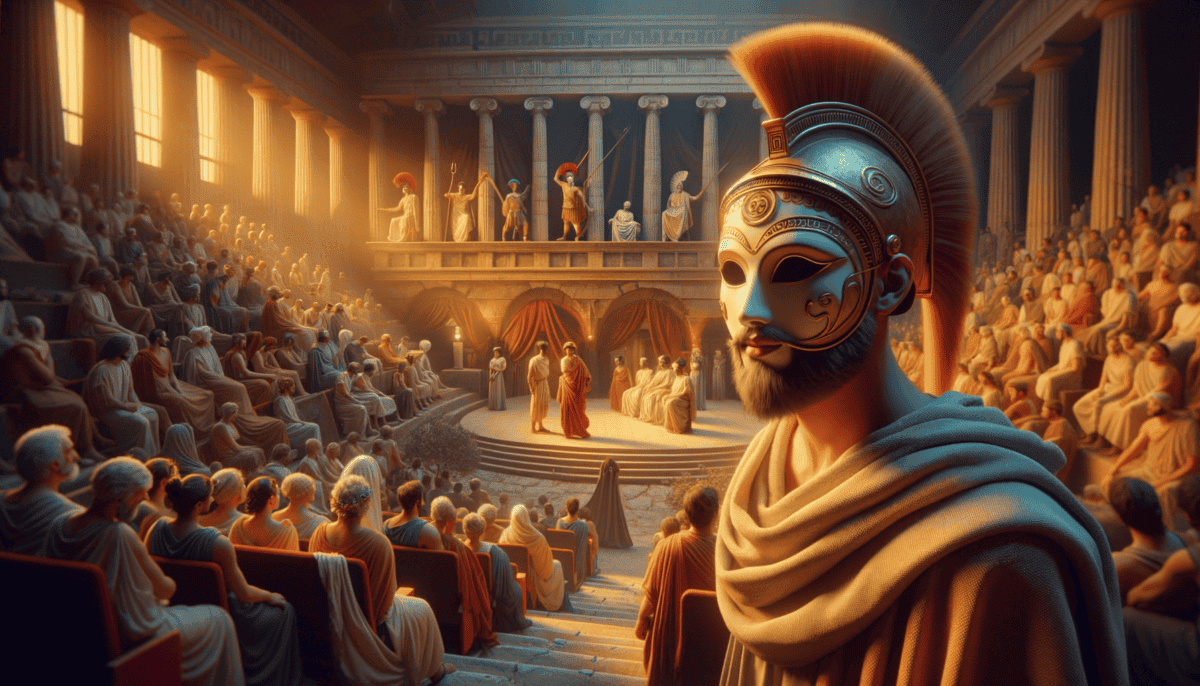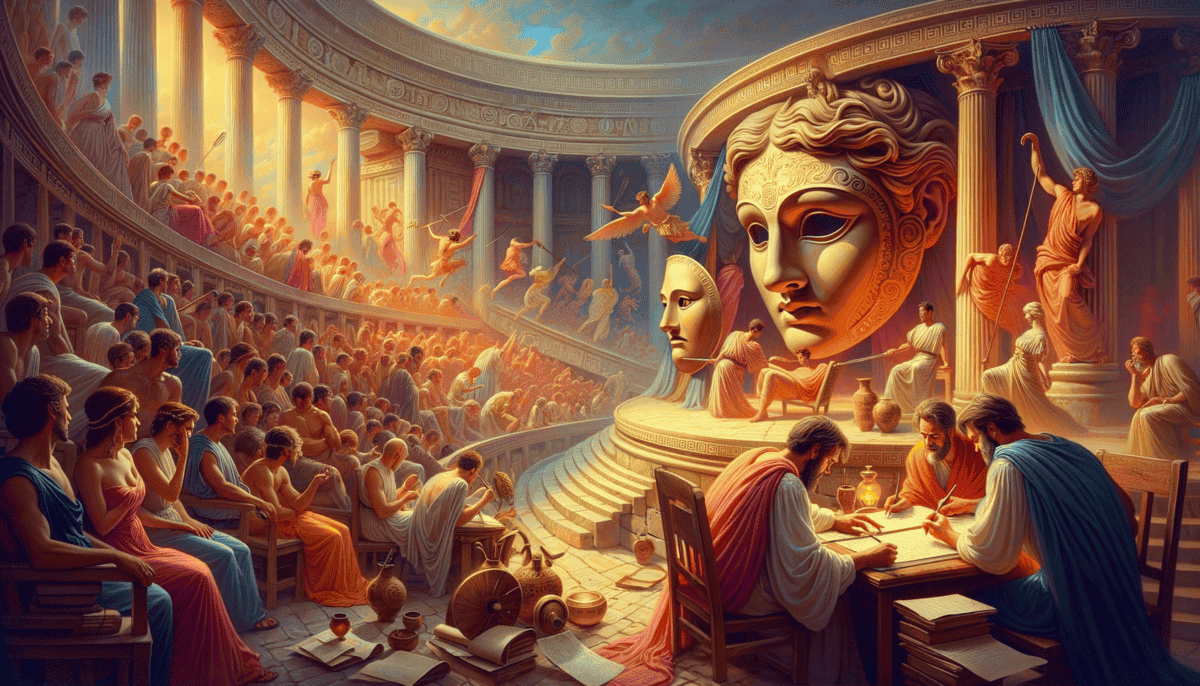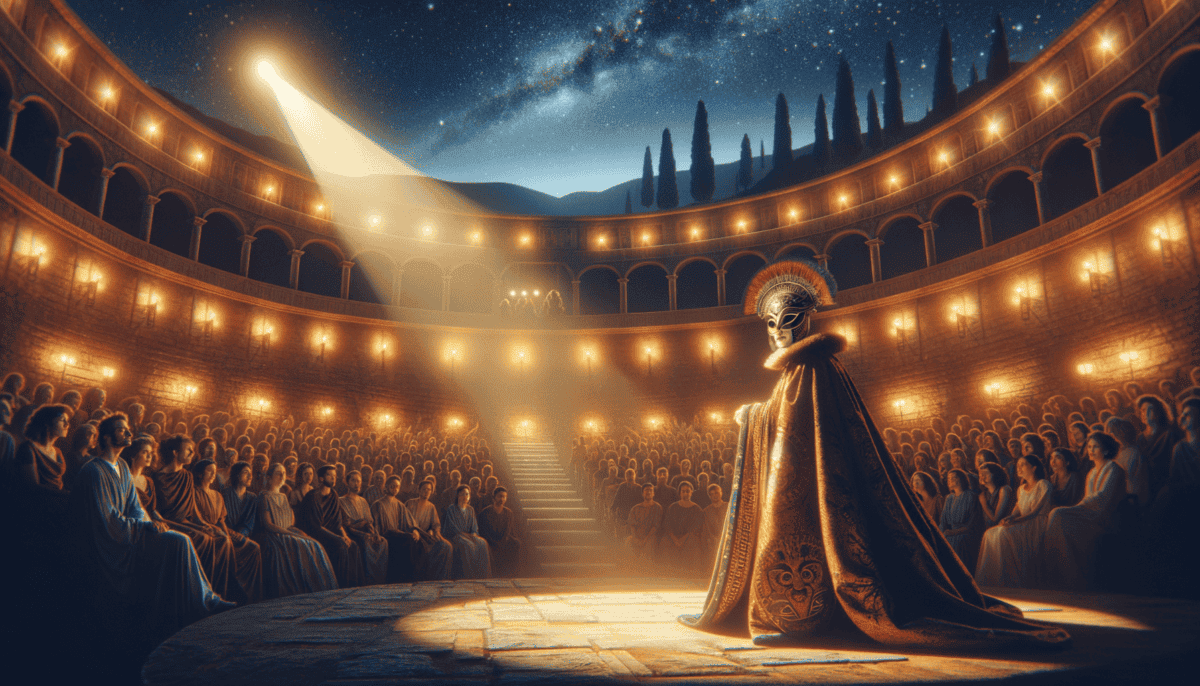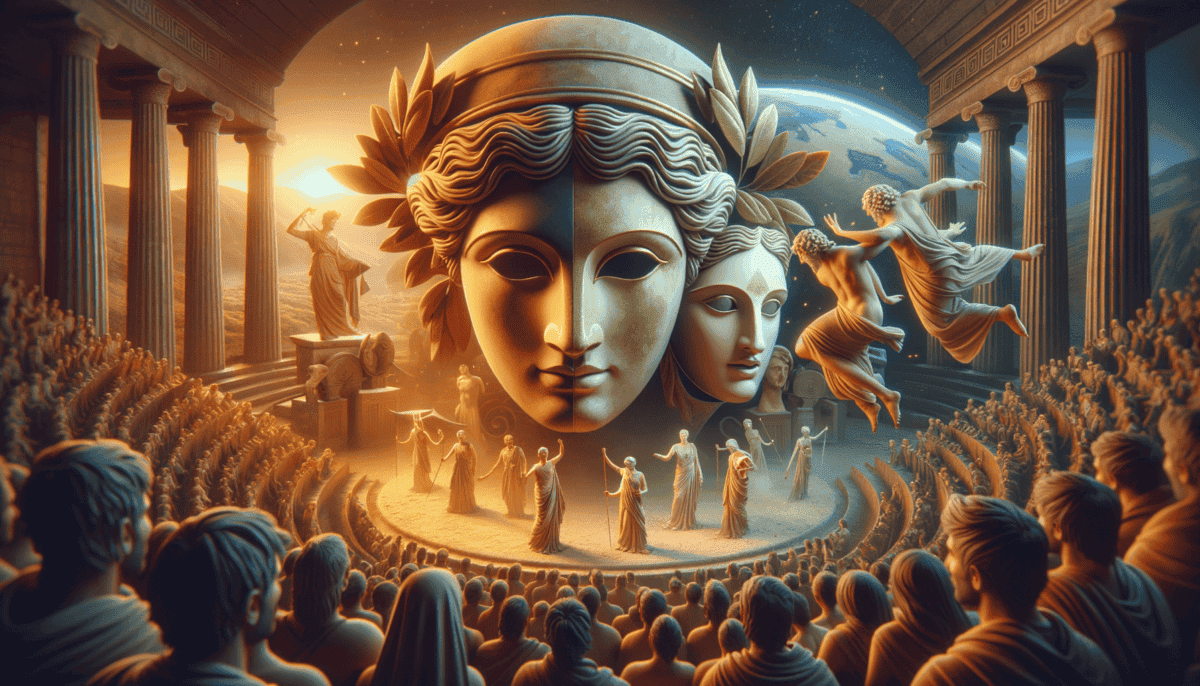The Sacred Stage
Long ago in ancient Greece, something magical happened every spring. The whole city of Athens would come alive with excitement!
Little Marcus tugged at his father’s sleeve as they walked through the bustling streets. “Papa, why is everyone so happy today?”
His father smiled. “Today is special, my son. We’re going to the Theater of Dionysus to watch a play!”
“Who is Dionysus?” Marcus asked, his eyes wide with wonder.
The father pointed to a beautiful statue of a man wearing grape vines. “Dionysus is our god of theater and celebrations. We have big festivals to make him happy!”
As they climbed the hill to the theater, Marcus saw something strange. “Papa, why are all the actors men? Where are the ladies?”
“Ah,” his father said, “that’s an important question. In our theater, only men can be actors. Even when they play queens or mothers or sisters!”
Marcus giggled. “But how do they look like ladies?”
“They wear special masks and pretty costumes,” his father explained. “And they practice very hard to move and speak like women.”
The Rules of the Stage
The theater had strict rules about who could perform:
- Only men could be actors
- They wore masks to play different characters
- Special clothes helped them look like women
- They had to train for many years
- Everything was done to honor Dionysus
Marcus watched in amazement as the actors appeared on stage. One wore a beautiful mask with long curly hair. “Is that really a man?” he whispered.
His father nodded. “Yes, and he’s one of the best actors in Athens. Watch how gracefully he moves!”
The sun was warm as they sat on the stone seats. Below them, the actor playing a queen spoke in a soft voice. His mask showed a sad face, and his movements were slow and careful.
“Why can’t women be in plays?” Marcus asked.
“That’s just how it is in Athens,” his father said. “Women stay home while men do things in public. But the stories we tell are about everyone – men, women, gods, and heroes!”
As the play went on, Marcus forgot that he was watching men dressed as women. The stories were so exciting! There were brave heroes, angry gods, and clever queens. Everyone in the audience laughed and cried together.
The sun was setting when they finally left the theater. Marcus couldn’t stop talking about everything he had seen. “Can we come back tomorrow?” he asked hopefully.
“The festival lasts many days,” his father smiled. “We’ll see more plays, and you’ll learn more about our wonderful theater.”
That night, Marcus dreamed of masks and costumes, of actors dancing, and of the great god Dionysus smiling down at them all. The magic of Greek theater had captured his heart, just as it had captured the hearts of all Athenians.
Behind the Mask
The morning sun peeked through Marcus’s window. Today was extra special – his father was taking him backstage at the theater!
“Look at all these masks!” Marcus gasped. The walls were covered with faces of every kind.
An actor named Theron smiled at Marcus. “Would you like to see how we become different people on stage?”
Marcus nodded eagerly. Theron picked up a mask with long curly hair and soft features. “This is how I become Penelope, a queen in our play.”
The Magic of Transformation
Theron showed Marcus how actors changed into women characters:
- Special masks with feminine features
- Long, flowing costumes called “chitons”
- High-heeled shoes to seem taller
- Padded clothes to change their shape
- Special ways of moving and talking
“Watch this,” Theron said. He put on the mask and a pretty blue robe. His voice became soft and musical. “Now I am Queen Penelope!”
“Wow!” Marcus clapped. “You really look like a lady!”
Another actor named Dion joined them. “Being an actor is like being a painter,” he explained. “But instead of using colors, we use our bodies and voices to make pictures.”
“Is it hard to pretend to be a woman?” Marcus asked.
Theron nodded. “Very hard! We practice walking differently. See?” He demonstrated a graceful walk. “And we make our voices higher, like this!”
Marcus tried copying the walk and giggled when he stumbled. “It’s tricky!”
The Power of the Mask
A wise old actor named Philon showed Marcus a special mask. It was painted with gold and had tiny holes for eyes.
“When we put on these masks,” Philon said, “we become someone new. The mask helps the audience believe in our story.”
“But how do people know what you’re feeling with the mask on?” Marcus wondered.
“Ah!” Philon smiled. “We use our whole body to show feelings. Watch!”
He put on a mask and showed how he could look sad by drooping his shoulders, or happy by standing tall and proud.
As the day went on, Marcus learned more secrets. He saw how actors used special shoes called “cothurni” to look taller. He watched them practice moving their hands like ladies at a party.
“Remember,” Theron said, “when we play women characters, we must respect them. We tell their stories with care and love.”
Later, Marcus watched a rehearsal. The actors danced and sang, their masks gleaming in the sunlight. Their movements were so beautiful that Marcus forgot they were men playing women.
“You see?” his father whispered. “That’s the magic of theater. When the story is good and the actors are skilled, we believe everything we see.”
As they walked home, Marcus held a tiny mask the actors had given him. He couldn’t wait to tell his friends about the amazing things he had learned behind the scenes of the great Greek theater.
Strong Women, Brave Stories
Little Anna sat in the front row of the theater museum. Her class was learning about special plays from long ago.
“Today we’ll meet three amazing women from old Greek plays,” said Ms. Helen, the teacher. “They were played by men, but their stories were very powerful!”
Meet Brave Antigone
“First, let’s meet Antigone,” Ms. Helen said. She held up a picture of a mask with determined eyes.
“Antigone was super brave,” she explained. “She stood up for what was right, even when the king said no. She wanted to give her brother a proper goodbye ceremony.”
“Standing up to a king? That’s really brave!” whispered Anna to her friend Tom.
Mighty Medea
Next, Ms. Helen showed them a mask with fierce eyes. “This is Medea. She was very smart and strong. But she was also very sad because people weren’t nice to her.”
“How did the men actors show such strong feelings?” asked Tom.
“They practiced a lot,” said Ms. Helen. “They learned special ways to move and speak. They wanted to make sure everyone understood how these women felt.”
Clever Electra
“Our last hero is Electra,” Ms. Helen said, showing a mask with sad eyes. “She was very smart and waited a long time to fix things in her family.”
The children tried making faces like the masks. Some looked brave like Antigone, others fierce like Medea.
The class split into groups. They used paper masks and bed sheets as costumes. Anna got to play Antigone.
- Antigone – The Brave Sister
- Medea – The Strong Fighter
- Electra – The Smart Planner
“Stand tall!” Ms. Helen called out. “These women were strong and proud!”
Anna stood as straight as she could. “I am Antigone! I will do what’s right!”
Tom played Medea. He made his voice strong and clear. “I am Medea! I will not be pushed around!”
Little Sarah was Electra. She walked slowly and thoughtfully. “I am Electra! I will fix what’s wrong!”
After class, Anna kept thinking about the strong women from the plays. “Even though men played these parts,” she told her mom, “the stories show that girls can do anything!”
That night, Anna dreamed of wearing a golden mask and standing on a big stage. In her dream, she was telling stories about brave women, just like the actors did so many years ago.
The next morning, she asked Ms. Helen if they could do more plays about strong women. “Of course!” Ms. Helen smiled. “There are so many more amazing stories to share!”
Making Magic with Words
The sun was setting over the museum as Ms. Helen pulled out an old scroll. “Now, let’s learn about the people who wrote these amazing plays!”
Meet the Story Makers
“Two very special writers were named Sophocles and Euripides,” Ms. Helen said, showing pictures of two men with curly beards.
Anna raised her hand. “Did they like writing about strong women?”
“They sure did!” Ms. Helen smiled. “They wrote some of the best stories about brave and smart women.”
“Even though they were men?” Tom asked, looking confused.
Writing from the Heart
Ms. Helen nodded. “These writers watched their mothers, sisters, and friends. They saw how strong women could be.”
“Let’s play a game,” Ms. Helen said. “We’ll be writers today!”
- Think about someone brave you know
- Write down what makes them special
- Turn their story into a play
Creating New Stories
Anna thought about her grandma, who makes the best cookies but also fixes cars. Tom wrote about his big sister, who plays soccer and helps him with math.
“The old writers knew something very important,” Ms. Helen explained. “Everyone has a story worth telling.”
The children grabbed paper and crayons. They wrote stories about brave people they knew. Some stories were funny, some were serious.
Sharing the Magic
“In old Greece, writers would share their plays in big contests,” Ms. Helen said. “Let’s have our own little contest!”
Everyone took turns reading their stories. Anna’s play about her grandma made everyone laugh and clap.
“See?” Ms. Helen said. “You’re all playwrights now! Just like Sophocles and Euripides!”
That afternoon, the children made a special stage from cardboard boxes. They put on all their new plays.
“My grandma is going to love this!” Anna said, holding her story tight.
“Maybe one day, people will perform your plays too,” Ms. Helen winked. “Just like they still do with the old Greek plays!”
Putting on a Show
The museum theater buzzed with excitement. Today was special – the children would watch real actors perform!
The Magic Begins
“Watch carefully,” Ms. Helen whispered as the lights dimmed. “See how the actors make you feel things.”
On stage, a man wearing a beautiful mask played a queen. His voice was soft and gentle.
“How does he sound so much like a lady?” Tom whispered.
“He practiced very hard,” Ms. Helen explained. “Just like when you pretend to be different things during playtime.”
The Audience Reacts
Some people in the audience were crying during the sad parts. Others laughed during funny moments.
Anna noticed something interesting. “Even though we know it’s a man playing a woman, we still believe the story!”
Learning the Tricks
- Use your voice in different ways
- Move your body like the character
- Wear costumes and masks
- Practice showing feelings
After the show, the actors came to talk to the children. They showed them how to change their voices and move differently.
Everyone Gets to Try
“Now it’s your turn!” Ms. Helen announced. She brought out a box of masks and costumes.
Tom put on a mask and pretended to be a wise old woman. His friends clapped – he was really good!
Anna tried being a brave warrior. She made her voice strong and stood tall.
Making Theater Magic
“See how theater lets us be anyone we want?” Ms. Helen asked. “That’s what makes it special.”
The children spent the rest of the afternoon putting on little plays. They switched roles and tried being all kinds of characters.
“I love that we can be anything on stage,” Anna said, still wearing her warrior mask.
“That’s right,” Ms. Helen smiled. “In theater, the only limit is your imagination!”
Legacy of the Masks
The class gathered one last time in the museum’s special theater room. After their amazing day of learning and playing, everyone was excited to share what they discovered!
Sharing Special Moments
“What did you learn about Greek theater?” Ms. Helen asked, smiling at her eager students.
“I learned that boys could play girls and make people believe it!” Tom said proudly.
Anna jumped up and down. “And they used masks and special voices to tell stories!”
Making New Friends
The museum actors came back to say goodbye. They brought special tiny masks for everyone to take home! ✨
- A happy mask for funny stories
- A sad mask for serious plays
- A crown to be a king or queen
- A special book about Greek theater
The Big Show
The children decided to put on their own play for their parents! They used everything they learned.
Tom played a brave princess. Anna was a wise old king. They weren’t afraid to try new roles!
A Special Message
“Remember,” Ms. Helen said, “theater helps us understand each other better. That’s why it’s still important today!”
The Show Goes On
As the children left the museum, they knew something special. The magic of Greek theater wasn’t just in old stories – it was alive in them!
“Can we do more plays at school?” everyone asked Ms. Helen.
“Of course!” she laughed. “The story of theater never ends. It keeps growing with new storytellers like you!”
And so, just like the ancient Greeks, the children learned that theater helps us share important stories, understand each other better, and imagine wonderful new worlds together!


